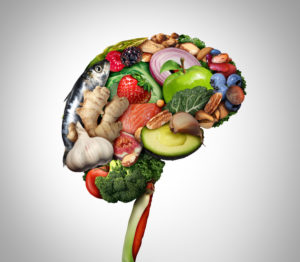The gut, otherwise known as the digestive tract, is considered the enteric nervous system. The enteric nervous system is known as our “second brain” of the gut, which involves hundreds of millions of neurons that connect the brain to the enteric nervous system, allowing the nervous system to control the gastrointestinal system. So essentially, the brain and gut are connected by a large network of neurons, chemicals, and hormones that allow us to know how hungry we are, whether we’re stressed or not, if we’ve consumed or absorbed a disease-causing microorganism and more.

The gut works to help the body maintain a state of equilibrium, so unless something is abnormal, we aren’t supposed to notice the gut-brain connection. Perhaps you’ve heard the term ‘hangry’ before, and it is a real thing. Being hangry refers to the point of a person feeling angry, short-tempered or irritable due to lack of food. When there is a lack of food in your system, your appetite is regulating the hormones in the brain. Similarly, when you are under the weather, you may lack an appetite and instead, would much rather curl up under the blankets and rest–just like when you feel certain emotions like sadness.
At the Gastroenterology Institute of Southern California, our team is highly skilled in advanced lab testing and treatments for patients who are experiencing gut issues. Some signs of imbalance in the gut-brain connection may involve bloating, certain cognitive or hormonal issues, such as brain fog or mood changes. If you are in need of an experienced gastroenterologist in Los Angeles, our team can help you every step of the way.

How Can I Rebuild My Gut Health?
The biggest link associated with the gut and brain is the type of food that we consume and how our bodies digest it. The gut is extremely advanced in ingesting the nutrition out of food and avoiding pathogens that can lead to certain conditions such as inflammation, autoimmune diseases, and other illnesses. One of the most important things we can do to maintain gut health is by improving our nutrition. Besides a nutritious diet improving gut health, it also leads to a better mood, enhanced cognition, a healthy digestive tract, and much more.
With that being said, there are many ways you can rebuild your gut health, including but not limited to:
1. Probiotic supplements
Many people choose to take probiotic supplements to rebuild their gut health. However, it is best to speak with your doctor before doing so.
2. Fermented foods
Another way to improve your gut health is by consuming fermented foods. In fact, fermented foods are a natural form of probiotics, which makes it a great source of getting the healthy gut foods into your system. Some examples of fermented foods include fermented vegetables, kimchi, kombucha, miso, sauerkraut and more.
3. Prebiotic fiber
Prebiotic fiber is nondigestible carbohydrates that probiotics feed off of, which is great for the gut. Prebiotic-rich foods include asparagus, bananas, garlic, onions, whole grains and more.
4. Watch sugar and artificial sweetener intake
Consuming a lot of sugar or artificial sweeteners may cause an imbalance in the gut, otherwise known as dysbiosis. Dysbiosis causes disruption of the gut, which can lead to a wide range of gut disturbances, such as bloating, constipation, diarrhea, stomach cramps, and more.
5. Manage stress levels
Another big factor that can disrupt your gut is a lot of stress. Whether it’s psychological stress, environmental stress (extreme heat, cold, or noise levels), sleep deprivation, and other sources of stress–it’s important to manage your stress levels in any way you can to ensure a healthier gut. There are many different stress management exercises, such as meditation, adequate sleep, deep breathing exercises, physical exercises (walking, jogging, swimming, etc), and much more. An important thing to keep in mind is that regular exercise, a healthy diet, and adequate sleep are key to reducing stress levels.
6. Avoid smoking
Smoking not only affects the heart and lungs–it affects your gut health, too. In addition, it increases the risk of cancer. Research has shown that individuals who smoke for over a 16-year period may experience potentially harmful microorganisms, as smoking can impact intestinal flora.
What Foods Are Bad For Gut Health?
What you eat plays a huge role in the health of your gut. It is important to consume foods that provide good bacteria for the gut. When your gut is damaged, it can potentially lead to many different issues, including but not limited to irritable bowel syndrome (IBS), Crohn’s disease, bloating, and much more. Here are some of the foods you should avoid to support your gut health:
 Sugar
SugarProcessed foods
Dairy
Red meat
Soy
Artificial sweeteners
Genetically modified organisms (GMOs)
What Are 3 Gut Superfoods?
If you want to improve your gut health, then it is important to add these three superfoods to your diet:
#1 Fermented foods
#2 Whole grains
#3 Prebiotic fiber-rich fruits (apples, bananas, and green plantains) and vegetables (asparagus, leeks, Jerusalem artichokes, and onions)
Contact a Gastroenterologist Los Angeles
At Gastroenterology Institute of Southern California, our team is dedicated to improving our patients’ health. If you are experiencing issues with your gut health, then our team is here to help every step of the way. Contact us today to schedule an appointment with our skilled gastroenterologist Los Angeles.


